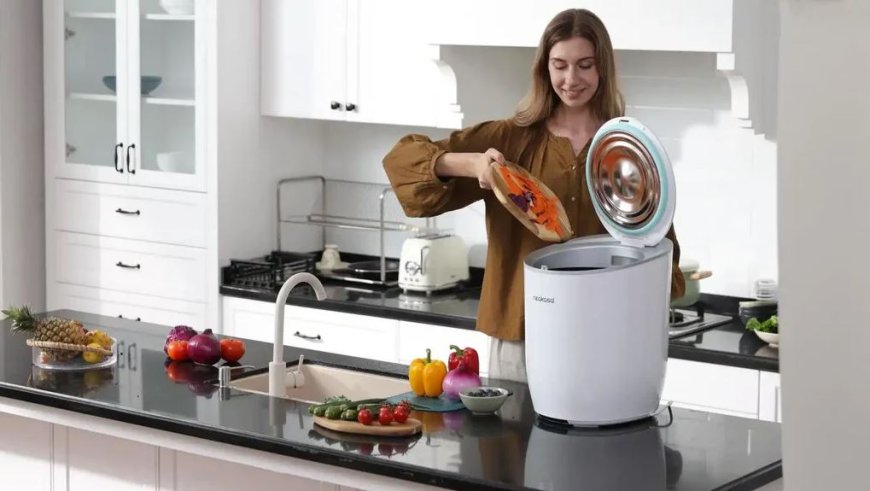Common Misconceptions About Electric Countertop Composters (And the Truth)

Electric composting has entered kitchens, patios, and even apartments. For gardeners and eco-conscious households, it is a way to turn everyday scraps into valuable compost, without the time or effort required by traditional methods. However, as countertop composting grows more popular, so do the misconceptions surrounding it.
Some people hesitate to use a countertop electric composter because they’ve heard it’s messy, ineffective, or too expensive. Others assume it only works for certain types of food or that it produces an unpleasant smell. These misconceptions often keep people from trying a tool that could fit perfectly into their daily routine.
Let’s break down five common misunderstandings and examine what’s true about electric composting on the countertop.
Myth 1: It’s just a glorified trash can
One of the most common misconceptions is that a countertop electric composter is just a fancy container for storing food waste. People often imagine it as something that holds scraps without doing much else.
These machines process food scraps through heat, grinding, and airflow, and in a few hours, they convert waste into a dry, nutrient-rich material. This isn’t storage, it’s transformation. Unlike traditional bins that hold waste until it’s taken outside, an electric composter actively breaks it into usable compost. You can add the output directly to garden beds or container plants or store it later.
Myth 2: You can’t compost many types of food
Another common belief is that electric composters only work for fruit and vegetable scraps. Some people think they can’t handle tougher items like small bones, citrus peels, or cooked food.
While every model varies, most electric countertop composter units today handle various materials. Many accept grains, eggshells, coffee grounds, and small poultry bones. This makes it much easier for people to compost kitchen waste without sorting it into compostable and non-compostable piles.
By expanding what can go into the bin, countertop composters help reduce overall waste and make composting a natural part of everyday cooking.
Myth 3: It smells bad
Composting has a reputation for being smelly. Gardeners who’ve worked with traditional outdoor piles might expect any composting system to have an odor, and that expectation often carries over to indoor units.
A well-designed electric countertop composter includes filters and sealed chambers that trap and neutralize odors. Activated charcoal filters absorb smells during the composting cycle, and the sealed design prevents leaks. If there’s a smell, it usually comes from overloading the bin or forgetting to clean it after several cycles.
When used properly, these composters operate quietly without producing any unpleasant odors. They’re designed for kitchens, which makes odor control a top priority.
Myth 4: It takes too much time and energy
People often assume that countertop composters are slow or energy-intensive. Running a machine for hours might raise concerns about electricity bills or efficiency.
In reality, most composting cycles last between 3 and 8 hours. The energy use is similar to that of a small kitchen appliance. Some models even allow you to schedule cycles during off-peak hours or at night. These tools are built for frequent, short use, not continuous high-energy output.
Time savings also come from skipping the work that traditional composting requires. There’s no need to turn piles, balance nitrogen levels, or wait months for usable material. The composter does the work while you do something else.
Myth 5: It doesn’t make “real” compost
Some people think the final product from a countertop electric composter isn’t the same as traditional compost. They might expect a dark, earthy material full of worms and microorganisms, and feel disappointed when the output looks dry or more like mulch.
The truth is, electric composters create what’s often called “pre-compost.” It’s a dry, stable material that’s safe to store and use in the garden. Once added to soil, it breaks down and feeds microbes naturally. It enriches the soil with organic material and helps plants retain moisture and nutrients.
Conclusion
Misconceptions about countertop composting often come from outdated ideas or second-hand opinions. A countertop electric composter doesn’t smell, use too much energy, or produce fake compost. It is a fast, clean way to reduce food waste and create soil-friendly material from your kitchen. It makes composting more accessible, convenient, and compatible with modern living, without compromising impact.





























































































































![Are AI Chatbots Replacing Search Engines? AI vs Google [New Research]](https://www.orbitmedia.com/wp-content/uploads/2025/05/How-often-are-we-using-AI-chatbots_.webp)

































